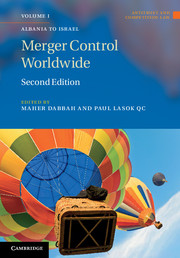Book contents
- Frontmatter
- Contents
- Preface
- List of Contributors
- Table of cases
- Table of Legislation and Official Guidance
- Introduction
- Albania
- Argentina
- Armenia (Republic of Armenia)
- Australia
- Austria
- Barbados
- Belgium
- Bosnia and Herzegovina
- Brazil
- Bulgaria (Republic of Bulgaria)
- Canada
- Chile
- China*
- Costa Rica
- Croatia
- Cyprus (Republic of Cyprus)
- Czech Republic
- Denmark
- Estonia
- European Economic Area
- European Union
- Finland
- France
- Germany (Federal Republic of Germany)
- Greece
- Hong Kong
- Hungary
- Iceland
- India
- Indonesia (Republic of Indonesia)
- Ireland
- Israel
- Italy
- Japan
- Kenya
- Korea
- Latvia
- Lithuania
- Macedonia (Republic of Macedonia)
- Malta
- Mexico
- Netherlands (The Netherlands)
- New Zealand
- Norway
- Pakistan
- Peru
- Philippines (Republic of the Philippines)
- Poland
- Portugal
- Romania
- Russia
- Serbia
- Singapore
- Slovakia (Slovak Republic)
- Slovenia
- South Africa
- Spain
- Sri Lanka
- Sweden
- Switzerland
- Taiwan
- Thailand
- Tunisia (Republic of Tunisia)
- Turkey
- Ukraine
- United Kingdom
- United States of America
- Uzbekistan
- Venezuela
- Zambia
- Index
Uzbekistan
Published online by Cambridge University Press: 05 November 2014
- Frontmatter
- Contents
- Preface
- List of Contributors
- Table of cases
- Table of Legislation and Official Guidance
- Introduction
- Albania
- Argentina
- Armenia (Republic of Armenia)
- Australia
- Austria
- Barbados
- Belgium
- Bosnia and Herzegovina
- Brazil
- Bulgaria (Republic of Bulgaria)
- Canada
- Chile
- China*
- Costa Rica
- Croatia
- Cyprus (Republic of Cyprus)
- Czech Republic
- Denmark
- Estonia
- European Economic Area
- European Union
- Finland
- France
- Germany (Federal Republic of Germany)
- Greece
- Hong Kong
- Hungary
- Iceland
- India
- Indonesia (Republic of Indonesia)
- Ireland
- Israel
- Italy
- Japan
- Kenya
- Korea
- Latvia
- Lithuania
- Macedonia (Republic of Macedonia)
- Malta
- Mexico
- Netherlands (The Netherlands)
- New Zealand
- Norway
- Pakistan
- Peru
- Philippines (Republic of the Philippines)
- Poland
- Portugal
- Romania
- Russia
- Serbia
- Singapore
- Slovakia (Slovak Republic)
- Slovenia
- South Africa
- Spain
- Sri Lanka
- Sweden
- Switzerland
- Taiwan
- Thailand
- Tunisia (Republic of Tunisia)
- Turkey
- Ukraine
- United Kingdom
- United States of America
- Uzbekistan
- Venezuela
- Zambia
- Index
Summary
Due to the unreliable nature of data and information published by the Government of the Republic of Uzbekistan, it is not really possible to arrive at an accurate assessment of the performance of the national economy. However, the general consensus is that Uzbekistan faces deep-rooted economic, political and social problems. Given the history and geographical location of the country, one might expect competition law and policy to be wholly absent from the national agenda in Uzbekistan. On the contrary, however, Uzbekistan has a system of competition law which includes a mechanism for merger control.
Relevant legislation and statutory standards
Merger and acquisition activities are regulated principally under the Law of the Republic of Uzbekistan on Competition and Restriction of Monopolistic Activity, which was enacted in 1996 (hereinafter referred to as ‘the CRMA Law’ or ‘the Law’). The CRMA Law is primarily concerned with preventing, restricting and suppressing monopolistic conduct, and it aims to protect and foster the appropriate conditions for the formation and effective functioning of competition within the market structure. The CRMA Law regulates relations which give rise to competition issues, and it applies to actions and agreements which potentially or actually result in the restriction of competition (or other negative consequences). Agreements or co-ordinated action linked to the following behaviour are considered to limit competition and are expressly forbidden, and such agreements are declared completely or partially void:
any type of price-fixing scheme or agreements involving resale price maintenance that obstruct the establishment of real market prices;
price discrimination;
control over or co-ordination of production, markets and capital investments;
division of the market by territorial principles, by volume of sales or purchases, by assortment of goods, by number or range of the sellers or buyers, by customers;
creation of barriers to entry or elimination of competitors.
- Type
- Chapter
- Information
- Merger Control Worldwide , pp. 1520 - 1526Publisher: Cambridge University PressPrint publication year: 2012



